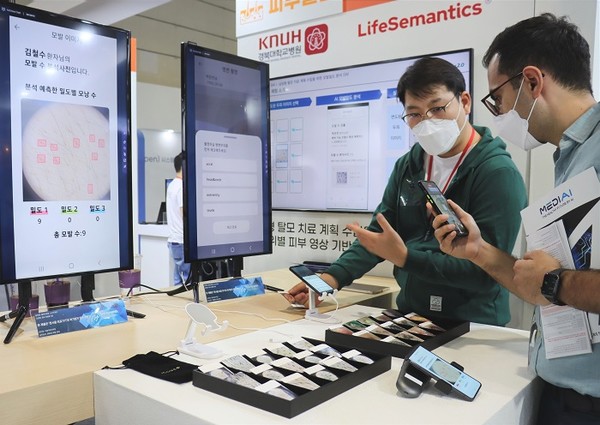Medical artificial intelligence (AI) solutions that assist medical professionals’ diagnosis are expanding their domain to skin diseases.

LifeSemantics is one of the companies most active in developing AI solutions to diagnose skin diseases. In the K-HOSPITAL 2022 Fair held from Sept. 29 to Oct. 1, the company unveiled its skin disease AI solution for the first time.
In collaboration with Kyungpook National University Hospital, LifeSemantics developed various software to diagnose hair loss and skin cancer. It was part of the Doctor Answer 2.0 Project supported by the Ministry of Science and ICT and the National IT Industry Promotion Agency. LifeSemantics has begun procedures to receive medical device approval for each of its software.
Among them, the “SW for analyzing hair density to establish hair loss treatment plan for men” will likely be used for making plans for hair transplantation surgery. According to LifeSemantics, AI analyzes scalp images, detects hair follicle density, and classifies follicle types, making it possible to estimate the number of hair that can be collected and transplanted.
Besides, the “SW to help discern and diagnose skin cancer based on skin images by area” is a solution that reads skin images taken with a smartphone and determines skin cancer, raising expectations to help detect skin cancer early and prevent it. The company developed the software using learning data on basal cell cancer, squamous cell cancer, and malignant melanoma.
"We introduced these software solutions to improve the efficiency of early identification and treatment of diseases while reducing the social burden on popular diseases, such as skin and hair loss,” said Kim Eung-hee, head of the R&D team at LifeSemantic’s ICT Research Institute, explaining the background for developing them.
Recently, the Ministry of Food and Drug Safety also opened the way for the appearance of skin disease-diagnosing medical AI solutions.
Monday, the regulatory agency designated LifeSemantics’ “skin cancer discerning and diagnosing aid software based on skin image by area” as a customized rapid classification item and classified it as the “software to detect skin cancer image and to assist diagnosis (E12010.01), a third-grade medical device.
LifeSemantics welcomed the ministry’s swift classification and designation of its software solutions.
“It is significant that our solution has been designated as the first case of customized rapid classification by the Ministry of Food and Drug Safety," a company official said.
Lululab is also speeding up the development of skin disease-diagnosing AI solutions. The company started as an in-house venture C-lab of Samsung Electronics before being spun off from the electronics giant in 2017.
The startup signed a business agreement with Severance Hospital last year to establish a database for skin diagnosis AI and has researched and developed AI that detects, classifies, and analyzes 14 chronic skin diseases, including atopic dermatitis, psoriasis, and leukoplakia, which the naked eye cannot classify as their symptoms are similar.
In July, the company signed an agreement on the “joint research to develop AI analysis solution of skin diseases” with Hanoi Medical University.
“We can be highly competitive in this area because not many companies have commercialized or are developing AI analysis products for skin diseases worldwide,” a company official said. “Although AI doesn't make a more accurate diagnosis than a doctor, it can help to diagnose more efficiently as an auxiliary means.”

